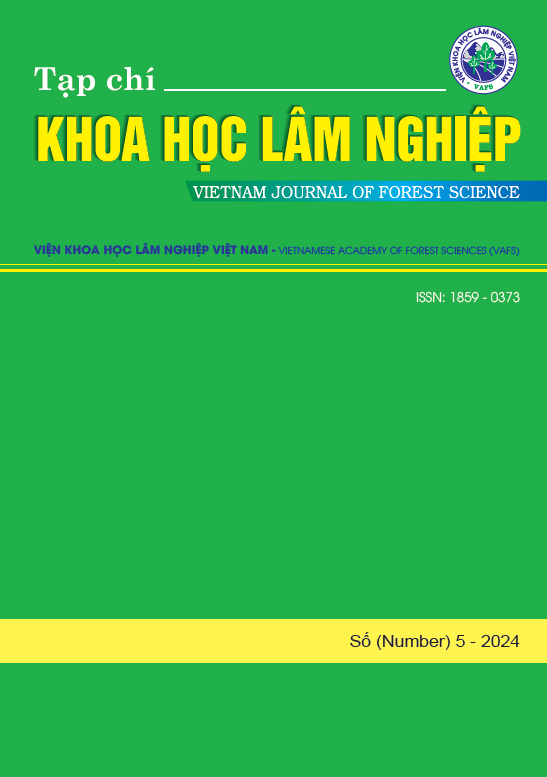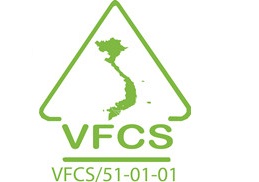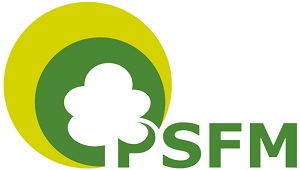KẾT QUẢ ĐIỀU TRA THÀNH PHẦN SÂU HẠI CÂY KEO, QUẾ VÀ HỒI Ở VƯỜN ƯƠM TẠI TỈNH BẮC KẠN
DOI:
https://doi.org/10.70169/VJFS.940Từ khóa:
Keo tai tượng, Quế, Hồi, Giám định, Thành phầnTóm tắt
Keo tai tượng (Acacia mangium), Quế (Cinamomum cassia) và Hồi (Illicium verum) là ba loài cây quan trọng trong ngành lâm nghiệp tại tỉnh Bắc Kạn. Mặc dù có giá trị kinh tế cao, việc mở rộng diện tích trồng cây Keo tai tượng, Quế và Hồi dẫn đến sự gia tăng các côn trùng gây hại, ảnh hưởng đến sự phát triển cây và sản lượng kinh doanh rừng trồng. Nghiên cứu này nhằm điều tra về thành phần các loài sâu gây hại ở vườn ươm của ba loại cây lâm nghiệp này. Kết quả cho thấy Bọ xít muỗi (Helopeltis theivora) là loài sâu gây hại chính trên cây Keo tai tượng, Bọ trĩ (Echinothrips sp.) là loài gây hại chính trên cây Quế, và một số loài ảnh hưởng đến cây Hồi. Những thông tin này làm nổi bật sự cần thiết của việc giám sát và phòng trừ các loài sâu hại này để duy trì lợi ích kinh tế và môi trường của ba loài cây này tại Bắc Kạn.
Tài liệu tham khảo
Aris, N. A. Z., Zakaria, N., & Arumugam, N. (2017). Diversity of Lepidoptera at REACH Biod Centre, Cameron Highlands, Malaysia. Journal of Wildlife and Parks, 32, 41-55.
Bui Van Dung, Pham Thi Vuong, Le Thi Tuyet Nhung, La Van Hao, The Truong Thanh, Truong Thi Huong Lan, Le Xuan Vi (2015) Composition of natural enemies of insect pets on star anise (Illicium verum) in Lang Son province. Journal of Vietnam Agricultural Science and Technology, 13, 34-42.
Đao Ngoc Quang, Nguyen Van Thanh, Le Van Binh, Tran Viet Thang, Trang A Tong (2023) The insect pests of Illicium verum Hook. f. in Northeast of Vietnam. Journal of Forest Sciences (Speical issue).
Freire, J. M., Cardoso, M. G., Batista, L. R., & Andrade, M. A. (2011). Essential oil of Origanum majorana L., Illicium verum Hook. f. and Cinnamomum zeylanicum Blume: chemical and antimicrobial characterization. Revista Brasileira de Plantas Medicinais, 13, 209-214.
Inoue, T., Miyata, H., Sakai, T., Inoue, K., Ohkuba, M., Nishimura, T., ... & Takahashi, M. (1997). Analysis of damage to Japanese anise tree, Illicium anisatum L. plantations caused by the camphor tree weevil, Dyscerus hylobioides (Desbrochers) (Coleoptera: Curculionidae) larvae in Shikoku Island, southwest Japan.
Khen, C. V. (2010). Moth diversity in Tropical Rain Forest of Maliau Basin, Sabah, Malaysia, with special reference to Ginseng Camp. Journal of Tropical Biology & Conservation (JTBC), 6.
Le Van Binh (2022). Final Report on the Ministry-level Science and Technology Project by the Ministry of Agriculture and Rural Development. Research on developing an integrated pest management method for Cinnamon cassia in important ecological regions of Vietnam.Manuel Miro Jodral (2004). Illicium pimpinella and Foeniculum medicinal and aromatic plants – industrial profiles, CRC Perss, 2004, pp.110-113.
Matos, L. F., da Cruz Lima, E., de Andrade Dutra, K., Navarro, D. M. D. A. F., Alves, J. L. R., & Silva, G. N. (2020). Chemical composition and insecticidal effect of essential oils from Illicium verum and Eugenia caryophyllus on Callosobruchus maculatus in cowpea. Industrial Crops and Products, 145, 112088.
Perley Spaulding (1989), foreign diseases of forest tree of the world, p.128.
Spitsyn, V. M., Bolotov, N. I., Kondakov, A. V., Tomilova, A. A., & Pham, N. T. (2017). New records of geometrid moths (Lepidoptera: Geometridae) from Myanmar based on DNA barcodes and morphological data. Check List, 13(5).
Sibatanp, A., Ogata, M., Okada, Y., & Okagaki, H. (1954). Male genitalia of Lepidoptera: morphology and nomenclature, I. Divisions of the valvae in Rhopalocera, Phalaenidae (= Noctuidae) and Geometridae. Annals of the Entomological Society of America, 47(1), 93-106.
Taiwan Forestry Research Institute (2012) The Investigation of the Moth Fauna and the Herbivorous Caterpillars on the Dominant Broadleaved Tree Species in Forest with Estimation of Their Energy Comsumptions.
Thành, N. V., & Thu, N. H. (2020). The damage situation and some biological characteristics of the shoot-boring weevil (Alcidodes sp.) on Cinnamon (Cinnamomum cassia LJ Presl) and Star Anise (Illicium verum Hook. f) in Vietnam. Journal of Forestry Science, (6).
Thu, P. Q. (2016). Research results on the composition of ínect pests and diseases affecting some major forest plantation species in Vietnam. Journal of Forestry Science, (1).
Williams & Wilkins (2009), Botanical abstracts, Volumes 7-8 botanical abstracts, 5 board of control of botanical abstracts, The University of Michigan, 2009, pp. 191-192.
Wang, G. W., Hu, W. T., Huang, B. K., & Qin, L. P. (2011). Illicium verum: a review on its botany, traditional use, chemistry and pharmacology. Journal of ethnopharmacology, 136(1), 10-20.
Yuelan, T., Bulie, Q., Zhengxiang, W., & Qiongfang, Y. (2004). Pseudodoniella sp. attacking Illicium verum. Forest Pest and Disease, 23(6), 23-24.
Zhao, M., Chen, P., Dai, X. X., & Lu, Y. H. (2009). Major kinds of diseases and insect pests of Illicium verum and corresponding control in funing county [J]. Forest Inventory and Planning, 1.
Zhou, B. G., Wang, S., Dou, T. T., Liu, S., Li, M. Y., Hua, R. M., ... & Lin, H. F. (2016). Aphicidal activity of Illicium verum fruit extracts and their effects on the acetylcholinesterase and glutathione S-transferases activities in Myzus persicae (Hemiptera: Aphididae). Journal of insect science, 16(1), 11.













